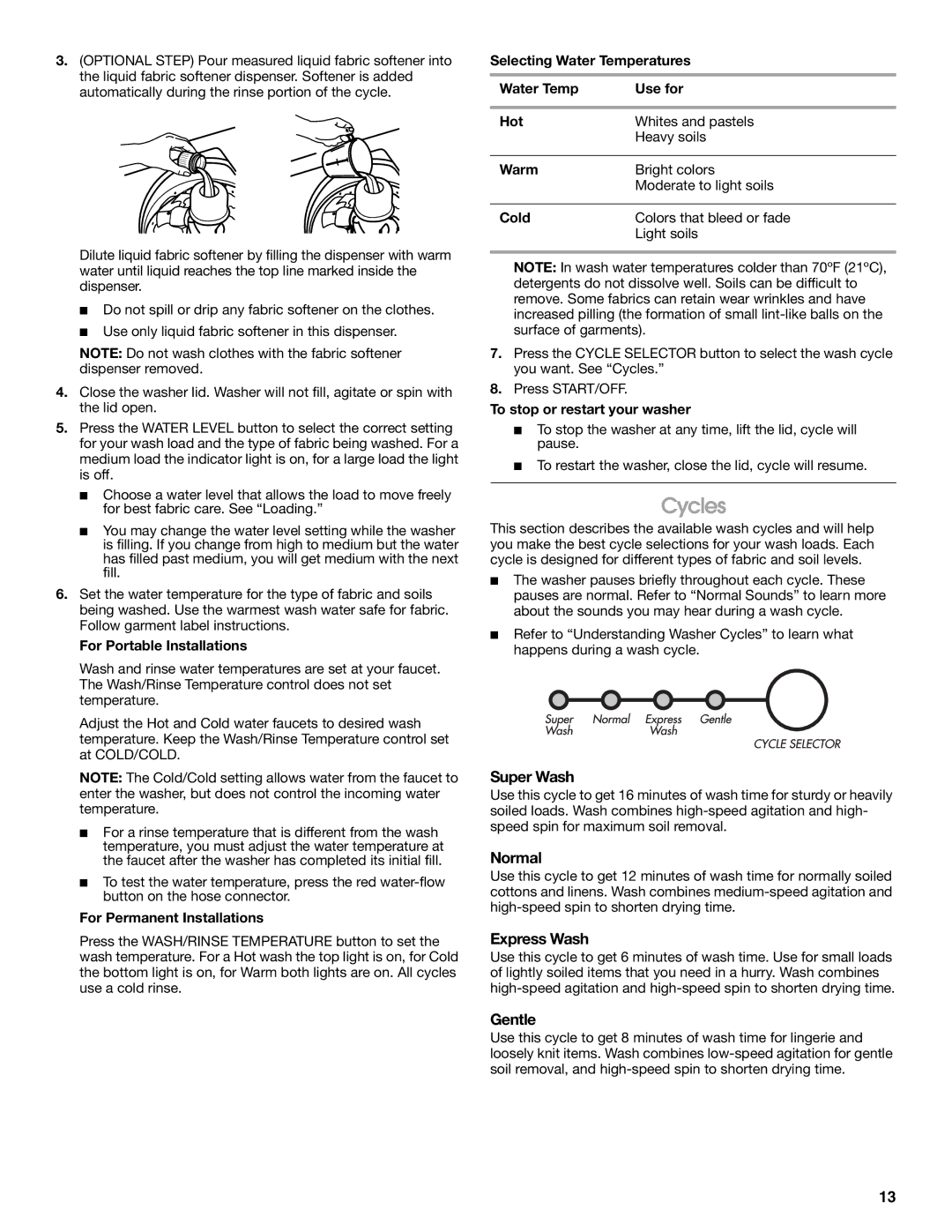
3.(OPTIONAL STEP) Pour measured liquid fabric softener into the liquid fabric softener dispenser. Softener is added automatically during the rinse portion of the cycle.
Dilute liquid fabric softener by filling the dispenser with warm water until liquid reaches the top line marked inside the dispenser.
■Do not spill or drip any fabric softener on the clothes.
■Use only liquid fabric softener in this dispenser.
NOTE: Do not wash clothes with the fabric softener dispenser removed.
4.Close the washer lid. Washer will not fill, agitate or spin with the lid open.
5.Press the WATER LEVEL button to select the correct setting for your wash load and the type of fabric being washed. For a medium load the indicator light is on, for a large load the light is off.
■Choose a water level that allows the load to move freely for best fabric care. See “Loading.”
■You may change the water level setting while the washer is filling. If you change from high to medium but the water has filled past medium, you will get medium with the next fill.
6.Set the water temperature for the type of fabric and soils being washed. Use the warmest wash water safe for fabric. Follow garment label instructions.
For Portable Installations
Wash and rinse water temperatures are set at your faucet. The Wash/Rinse Temperature control does not set temperature.
Adjust the Hot and Cold water faucets to desired wash temperature. Keep the Wash/Rinse Temperature control set at COLD/COLD.
NOTE: The Cold/Cold setting allows water from the faucet to enter the washer, but does not control the incoming water temperature.
■For a rinse temperature that is different from the wash temperature, you must adjust the water temperature at the faucet after the washer has completed its initial fill.
■To test the water temperature, press the red
For Permanent Installations
Press the WASH/RINSE TEMPERATURE button to set the wash temperature. For a Hot wash the top light is on, for Cold the bottom light is on, for Warm both lights are on. All cycles use a cold rinse.
Selecting Water Temperatures
Water Temp | Use for |
|
|
Hot | Whites and pastels |
| Heavy soils |
|
|
Warm | Bright colors |
| Moderate to light soils |
|
|
Cold | Colors that bleed or fade |
| Light soils |
NOTE: In wash water temperatures colder than 70ºF (21ºC), detergents do not dissolve well. Soils can be difficult to remove. Some fabrics can retain wear wrinkles and have increased pilling (the formation of small
7.Press the CYCLE SELECTOR button to select the wash cycle you want. See “Cycles.”
8.Press START/OFF.
To stop or restart your washer
■To stop the washer at any time, lift the lid, cycle will pause.
■To restart the washer, close the lid, cycle will resume.
Cycles
This section describes the available wash cycles and will help you make the best cycle selections for your wash loads. Each cycle is designed for different types of fabric and soil levels.
■The washer pauses briefly throughout each cycle. These pauses are normal. Refer to “Normal Sounds” to learn more about the sounds you may hear during a wash cycle.
■Refer to “Understanding Washer Cycles” to learn what happens during a wash cycle.
Super Wash
Use this cycle to get 16 minutes of wash time for sturdy or heavily soiled loads. Wash combines
Normal
Use this cycle to get 12 minutes of wash time for normally soiled cottons and linens. Wash combines
Express Wash
Use this cycle to get 6 minutes of wash time. Use for small loads of lightly soiled items that you need in a hurry. Wash combines
Gentle
Use this cycle to get 8 minutes of wash time for lingerie and loosely knit items. Wash combines
13
